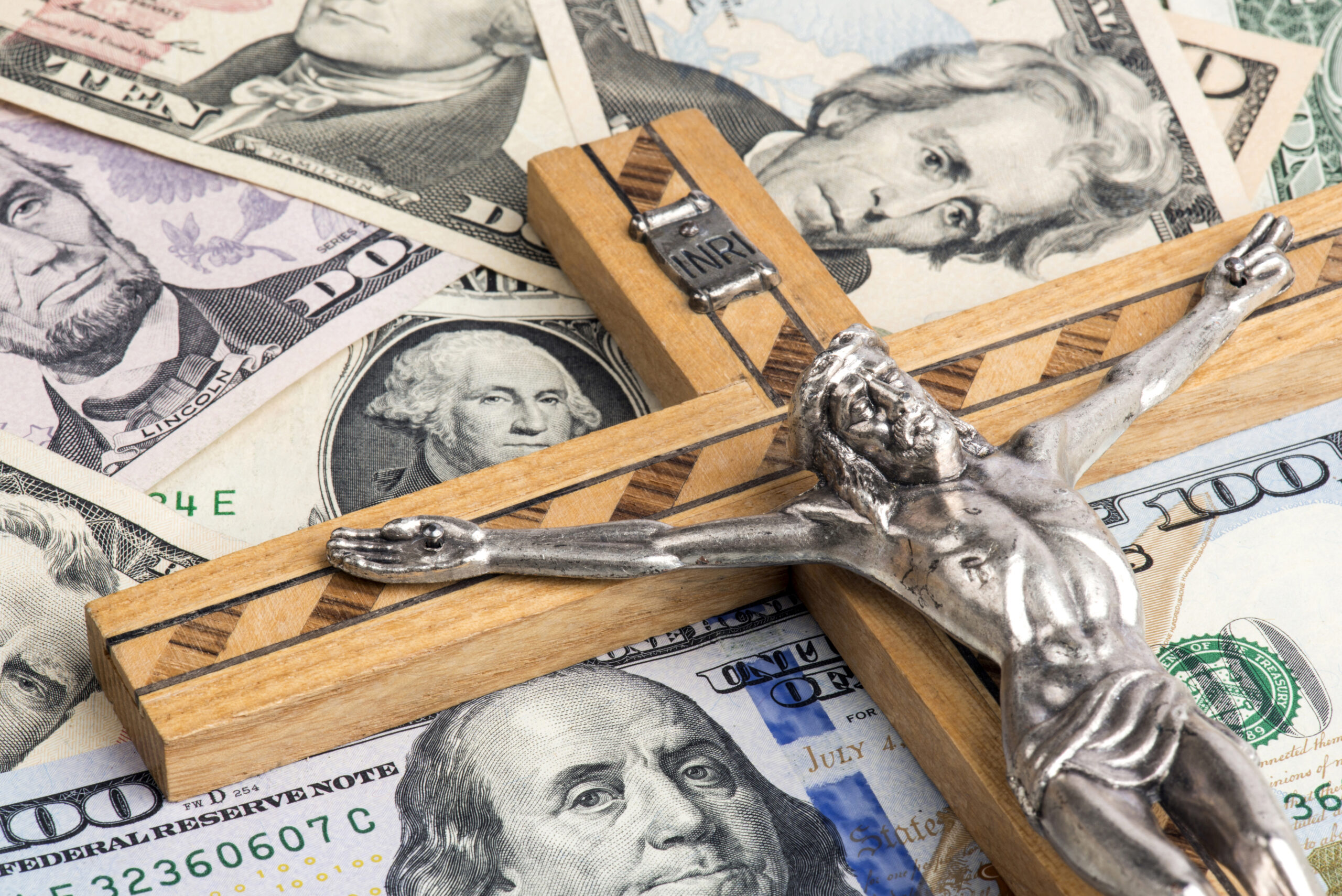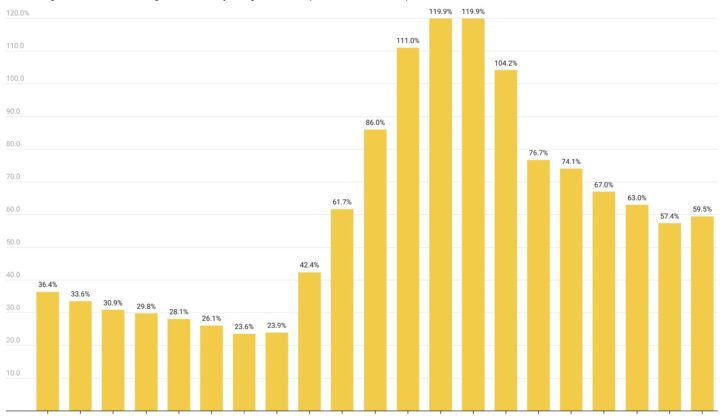
Introduction: A Marginalised Discipline
The issue of debt is a contemporary question, and also one that has been examined for centuries by theologians. . Presented as a simple relationship between those who have, and give, and those who don’t, and take, debt has become the controlling concept in our societies and economies. The housing crisis in Ireland causes experts to lament ‘financialisation’, a word that points to how houses primarily function as equity and leverage; mini-reservoirs for liquidity.[1] A person’s future prospects rely in large part on educational attainment but we have arranged access to that through loans, so that our youth emerge into the working world already in the red. Debt has become ubiquitous; even the one percent find themselves leveraged to the hilt in a world built on a promise to sometime pay back what has been taken.
In this essay I will reflect theologically on the concept of debt and find that it operates at the heart of the Christian narrative. Historical examinations of how debit and credit intersect theologically rejuvenate consideration of the issue in a contemporary context, as they relativise indebtedness in our individual consciousness and open new political horizons for who it is we ‘credit’.
Why God Became Man
A theological consideration of indebtedness led me to the masterpiece of Anselm of Canterbury Cur Deus Homo (Why God Became Man), which was compiled in about 1094AD. In it, Anselm examines the central claim of Christianity – that God became human – using the analogy of debt. For Anselm, sin does not mean doing a bad thing, but rather refers to a state of existential deficit best described in terms of debt. His way of thinking about the core tenets of Christianity integrated debt, sin, and – to use another economic term – redemption. This rigorous thinking about these concepts can inform our understanding of them even today.
What is posited resonates strongly with our contemporary conversations. Anselm assumes that the world in which we find ourselves is good, foreshadowing contemporary environmentalism. He also offers an explanation for how that good has gone so awry. Humans, called to keep and care for this world, instead established a realm over which they could dominate. This is not, for Anselm, a myth about trees and forbidden fruit, but a reality, which has consequences beyond calculation.
Paul wrote to the Christians in Rome that ‘The wages of sin is death’ (Romans 6:23). Anselm might supplant that last word as ‘debt’. The plight of humanity is to find ourselves, despite ourselves, hurtling towards our own annihilation – a plot familiar from its retelling in novels, films and plays.
In Anselm’s argument, only God can save, yet only humanity has sinned. God becomes human in the form of Jesus, who was raised in an ordinary family, enculturated within his society, and trained in a craft. So far, so human. But, unlike the rest of humanity, he lives in perfect harmony with the world which has been spoiled by human rebellion. His freedom from complicity is his unique difference, and what is being claimed when Christians contend that Jesus was without sin.
Reading the Gospels, we can see this liberty in effect. The alliance of political, legal, and religious authorities that arranged his execution were angered by the almost imperious sense in Jesus’ words and actions that the complex structures of society did not apply to him. All the ways we have devised to mark someone in or out, good or bad, valuable or useless – our very morality appears to be condemned as camouflage for our basic, fundamental, universal existential debt.
Jesus wasn’t put to death simply as a heretic, or a revolutionary, never mind as some vague philosopher espousing a harmlessly generic call to love each other. All the forces of civilization had to array themselves against him because compared to him, they are exposed as savage.
As Anselm explains it, Jesus dies a death due to all who are in this cosmic debt to sin. But, free from sin, he himself did not owe any debt. He did not need to face death. As man he was blameless, as God he was perfect, and so his trial, torture and execution end up doing far more than exposing once and for all the violence at core of human civilisation.
Thus, the events of Easter serve as a cosmic rebalancing. The revolt against God and his good creation represented by sin is more than met in the inestimable love of Jesus. We who are bankrupt when left to our own devices, now find ourselves recipients of this infinite credit. The unfathomable value of the Godman obliterates the deficit accrued through all of history – those long dead and those waiting yet to be born – such that his resurrection is not a conjuring trick but a signal towards a fundamentally restored Creation.[2] Christians very quickly came to talk about the events of Easter as an actual new creation, which lingers in our culture in the way we demarcate time into BC and AD.
In Anselm’s words:[3]
This debt [of sin] was so large that, although no one but man owed it, only God was capable of repaying it, assuming that there should be a man identical with God… the life of this man is so sublime and precious that it can suffice to repay the debt owed for the sins of the whole world, and infinitely more besides.[4]
Anselm’s account of how God became a human drops us straight into a conversation theology has been cultivating for millennia. It is a ‘dogmatic’ conversation, having to do with things that are believed by Christians about God, but that conversation is embedded in concepts with which we are all too familiar: credit and debt, honour and shame, desolation and consolation. To understand fully why that might be relevant to contemporary society, we must first consider how contemporary society is ordered.
The Age of Debt
Consider a student set to graduate this summer,ready for the rest of their life to begin. Unless they can draw on familial wealth, they will likely begin applying for their first graduate positions with considerable debt.[5] At every subsequent step, that debt is likely to increase. Rising levels of credit card debt can be easily understood when the average rent in Dublin now tops €1700.[6] Even in an inflated market, such stratospheric rental costs incentivise property ownership, which entails further debt – if and only if the requisite deposits for eligibility are achieved.[7]
The student is a useful representative example of how our contemporary society is ordered because he or she allows us to consider how things will develop, not just over news-cycles or election-cycles, but across the human life-cycle. When we discuss things in terms of debt, we too easily imagine it as an accounting problem, to be resolved in a spreadsheet. But we know that debt, or the need to access credit, has real-world consequences. Indebted reality shapes the opportunities that the graduate might reasonably pursue. Further down the road, there is surely a connection between debt and life-structure. It is very straightforward for older generations to conclude that young Irish people are not marrying or raising families at the same rate as older people because of some nebulous idea of ‘changing values’, which may in part be true. But the material reality that house-values have changed might offer more explanatory power. Debt is not just a financial construct but a lived reality. The person who – because of eye-watering rental costs – is living paycheque-to-paycheque even though earning a healthy salary – may need to rely on credit cards, overdrafts and loans just to get by. Marriage and/or babies get pushed down the list of priorities when basic financial security is absent.
It is in this sense that we live in an age of debt. Oscar Wilde had one of his characters quip that cynicism means knowing the price of everything and the value of nothing, but when we order our lives around access to credit, we are remaking society in a foundationally cynical direction.[8]
If we take a snapshot of debt levels in Ireland today, things look relatively healthy – at least in comparison to the latter years of the Celtic Tiger. The lasting effect of Covid-19 restrictions remains to be seen but initially it looks like in aggregate the economy has seen a striking increase in the rate of savings. Still, at the onset of the crisis, Ireland was both the fifth most indebted nation in the EU and that level of debt was taken to be no cause for alarm.[9]
When we look at general government debt ratios during the period of the euro, we find this conclusion is borne out. Ireland currently operates with a ratio about twice what it was in the halcyon days of the early 2000s. But the ratio peaked during the crisis at four times the level we enjoyed in 2002. The conclusion we can draw is that the level of indebtedness seen across the society, while not being something about which we are complacent, may be economically sustainable. But we would be making a deep mistake if we thought that debt functioned primarily on the economic level. What our sample student allows us to see, as the decades of her adulthood stand before her, is that she enters into every choice bounded by the burden of debt and the potential of credit. Such a scenario may be economically sustainable, but it is politically and psychologically totalising.
The Theology of Debt
Let us consider again that college student. They emerge from their graduation ceremony bearing a scroll which sits atop their already mounting debt. We can now see that the prevalence of debt is not simply an economic proposition. It may be bad news for the markets if debt escalates out of control but it might have all sorts of benefits for those charged with keeping society ticking over. The indebted citizen is the domesticated citizen. That student is aware that whatever else they do, next month there will be another payment to be made to chip away at their debt. Failure to make that payment will close off access to credit needed for when they have to suddenly replace the transmission on the car that allows them to commute or to access that postgraduate diploma neededfor promotion, or they need an urgent flight to visit a gravely ill relative. Given that context, a choice between exploring the vital contribution that Catholic Social Teaching might make to Irish social policy at the Jesuit Centre for Faith and Justice (on the modest salary of a non-profit employee)and joining a consultancy firm’s graduate program (where they will innovate new vocabulary to describe mass redundancy) where the salary will likely exceed six figures within five years, may not be a real choice at all.
There are, thus, at least two ways in which we live in an age of debt – a financial sense that can be charted in a spreadsheet as a ratio against assets and a political sense that exerts its force in the imagination of the citizen who stands indebted. A mortgage is, etymologically, the death-debt. Our student stands in for us all as the indebted citizen who is not simply a person with financial obligations which hold them back but is a ‘debtor subject’ made insecure on a very basic moral level by the asymmetry of finance.[10]
Historically, the Christian church waged, at times, a successful war against debt because theology was able to discern this power dynamic. Repeated exhortations in the Law of Moses forbade the Israelites from lending at interest (Exodus 22:25, Deuteronomy 23:19, Leviticus 25:36), the prophets railed against violations of that code (Ezekiel 18:13, Habakkuk 2:7), and the wisdom literature underlined the social dynamics at play (Proverbs 22:7). The creditor and the debtor do not meet each other as equals. Their transaction is consensual only in a formal sense, as the citation above puts it clearly: “the borrower is the slave of the lender”.
These Scriptural injunctions were developed theologically so that long before the rise of modern banking, a scholastic theologian would have been able to argue that interest-bearing loans are problematic because they effectively slice up an individual’s future and hand it over to the creditor.[11] To take a loan is both a necessary step in securing a home, or means of transport, or an education, and it is also a promise that you will dedicate a portion of your time that has not yet happened to serve the needs of the one who extended credit.
Politically, debt promotes docility. Arriving into wider society having finished university, the student bearing debt has already been shepherded away from economically less fruitful paths, and discouraged from implementing what they have learned in modes that disrupt the economy or society. Debt does not just chasten us economically. A more fundamental chastening exists in the political sphere.
Conclusion: A New Marginal Revolution
Theology turns out to have something significant to say to our young student and to society more widely. It can help us discover that there are ways to get at the injustice of an indebted society that predate Marx and his many descendants. And it can alert us to a third way that debt functions.
The student graduates bearing a financial debt and is politically constrained by this debt. But these are the debts that can be easily tabulated and processed by an algorithm. The primary debt our new graduate carries is a debt that is definitionally beyond numerical representation. They are in debt to their teachers down through the years who carried them to this point. They are in debt to parents or other family members for the encouragement and structure needed to succeed. They are in debt to friends who made the process so enjoyable. Even harder to compute, they are in debt to the toil of those who established the institution and indeed the discipline they studied in. They stand on the shoulders of giants – along with countless ordinary adjunct lecturers, departmental secretaries, and IT technicians that make “knowledge acquisition” possible. Beyond politics and economics, they are metaphysically in debt.
We all are.
Now when we think about this fundamental debt – the original debt[12] – that social creatures bear to the societies that pre-exist them and upon whom their existence rests, we find that Anselm’s medieval musings in Cur Deus Homo suddenly has real political practicality.[13] The reflective student, upon graduating, may feel overwhelmed by the magnitude of the debt to all those who made their path possible. How could they repay it? This wonder may grow exponentially as they consider that every aspect of their life rests on a similar, unlikely, fragile, and magnificently unrepayable foundation of human effort.
When it comes to the good in humans and the societies we construct, the merit involved cannot be calculated. When it comes to the bad, the dishonour is similarly infinite. For every graduate who has received a 1:1, we know that there were entire classes of people bypassed historically or who are actively obstructed today. We can extol the university system that the student stands within only as long as we don’t recall all the crimes of omission and commission enacted by that same system.
In this light it becomes visible that the moral mathematics of infinity that Anselm unfolds in his account of why God became human has direct relevance for understanding the age in which we live. Our fundamental debts – the kind that can never be compressed into a euro amount – are so great that only God is capable of making the accounts balance. We cannot claim for ourselves any merit based on our own effort that is not first dependent on the efforts of another, such that the merit that we are granted appears so sublime and precious that it can suffice to devastate forever the idea that our lives can be transacted in easy columns of debt and credit.
Theology makes a potent political claim: if everyone is in debt, no one is the creditor. The claim that Anselm makes is that a universal human constant of ‘indebtedness’ was exposed by Jesus of Nazareth’s death and resurrection. The cross exposes the universal debt and the empty tomb obliterates it.
In Anselm’s feudal context, the Easter events represent a divine action which was infinitely honourable.[14] In our neo-feudal context of contemporary capitalism, we can say that it represents a divine action which is infinitely creditable. When God so fully credits Creation, we cannot quite so contently believe in bankruptcy.
The political impact of Anselm’s ancient theological argument can function as an antidote, a counter-narrative, an intervention from the past with pressing contemporary relevance. If we are credited without debt – then gratitude is the appropriate response. We are not debtor subjects, but grateful recipients. Cost/benefit analyses dominate utterly our political imagination. But if at the heart of the Christian claim lies a conviction that a line can never be accurately drawn to truly account for what a good has cost or how deeply a benefit proliferates; it has consequences for debt in both the economic and political sphere. It gives us new language to say that there are some things of value such that to talk of cost is absurd and it offers a new accounting of who and what we owe such that our prototypical student should not reject the path where they might do good without earning. If they are cosmically in credit as a result of Easter, they are liberated to live perpetually in debt to spite the markets.
Theology offers here a new ‘marginal revolution’. The cross upon which Jesus died, as Anselm so clearly understood, is a revolutionary overturning of the human hierarchies replicated across societies: exposing the strong as weak, the criminal as good, and the bankrupt as the one from whom all credit is derived.
The Gospel does not devastate all economic arrangements – you can still do business after Good Friday. But it leaves all accounting of morality attached to credit and debt in tatters. The rich are not good because they are rich. The poor are not bad because they are poor. The voices from the margins are the voices theology seeks out because they are the voices that are owed the attention of those in the centre. They are the voices through whom God is heard.
Kevin Hargaden is Director of the Jesuit Centre for Faith and Justice and its Social Theologian. He is the author of several books, most recently Theological Ethics in a Neoliberal Age (Cascade, 2018).
[1] Manuel B. Aalbers, “Subprime Cities and the Twin Crises,” in Subprime Cities: The Political Economy of Mortgage Markets, ed. Manuel B. Aalbers (Chichester: Wiley-Blackwell, 2012), 10–13.
[2] Much more can and must be said about Easter, but nothing meaningful can be said about Christianity that does not involve this divine transaction to some degree. There is a vast secondary literature on Anselm’s argument – which has certainly not been received with universal acclaim within the church. For those who want a short-cut to one of the finer pieces, consider: Stephen R. Holmes, “The Upholding of Beauty: A Reading of Anselm’s Cur Deus Homo,” Scottish Journal of Theology 54, no. 2 (2001).
[3] Anselm’s gendered language is left unchanged but the meaning should be clearly understood to refer to humanity.
[4] Anselm of Canterbury, “Cur Deus Homo, 2.18”, The Major Works, ed. Brian Davies and Gillian Evans (Oxford: Oxford University Press, 1998), 348.
[5] Although the Irish educational system promises to be free of tuition fees, Zurich estimate that, on average, a degree secured while living at home costs €18,088 and that rises to €33,868 if living on campus. Zurich Life Assurance PLC, “The Cost of College in Ireland 2020,” Zurich Life, accessed April 26, 2021, https://www.zurich.ie/savings-and-investments/education-costs/college/.
[6] Eoin Burke-Kennedy, “Rental Costs Rise by 2.7% in 2020 as Dublin Rents Average €1,745,” The Irish Times, March 21, 2021, https://www.irishtimes.com/business/economy/rental-costs-rise-by-2-7-in-2020-as-dublin-rents-average-1-745-1.4518743.
[7] Ernst and Young report that affordability is beyond the reach of first-time buyers in half of the counties of Ireland, leading them to openly speculate that we are at the end of the era of “owner occupation”. Annette Hughes, “Just How Affordable Is Housing for Ireland’s First-Time Buyers?,” Strategy and Transaction Report (Dublin: EY Consultants, February 26, 2021), https://www.ey.com/en_ie/strategy-transactions/just-how-affordable-is-housing-for-ireland-s-first-time-buyers–.
[8] Oscar Wilde, Lady Windermere’s Fan (London: Penguin, 1995), 55.
[9] Amie Lajoie, Exploring Household Debt in Ireland (Dublin: TASC, 2020), 10.
[10] In all of this, I am deeply indebted to the work of Italian social theorist Maurizio Lazzarato, whose works – especially Governing by Debt and The Making of the Indebted Man have been formative. This quote comes from The Making of Indebted Man, trans. Joshua David Jordan (Amsterdam: Semiotext(e) Intervention Series, 2012), 5. See also: Kevin Hargaden, Theological Ethics in a Neoliberal Age (Eugene, OR: Cascade, 2018), 37.
[11] Famously, Thomas declared that lending at interest is unjust in itself because it is “to sell what does not exist, and this evidently leads to inequality which is contrary to justice.” Thomas Aquinas, Summa Theologica II-II, q. 78, https://www.newadvent.org/summa/3078.htm.
[12] Here, my thinking is clearly informed in the background by Graeber’s account of debt as a modern development of a much more universal existential state: that state where all we can say to another is “I’ll owe you”. David Graeber, Debt: The First 5,000 Years (Brooklyn, NY: Melville House, 2011).
[13] Indeed, the essay ‘False Accounting’, in this very volume testifies to how any social endeavour to precisely account for a slice or the whole of this debt is likely to end up violently distorting lives. The super-abundant response to harm and dishonour that Anselm sees enacted in the life, death, and resurrection of Jesus subverts our retributive logic entirely, exposing how a system of justice that is not merciful is parody – or as Derek describes it within the piece in question, a “torment”.
[14] Granting the broader feudal context is not meant to suggest that this is all that is at play for Anselm. I am convinced by David Whidden III’s argument that the Rule of Benedict is the best specific context for reading the text. David L. Whidden III, “The Alleged Feudalism of Anselm’s Cur Deus Homo and the Benedictine Concepts of Obedience, Honor, and Order,” Nova et Vetera 9, no. 4 (2011): 1086.
Is this all a bit too much?




